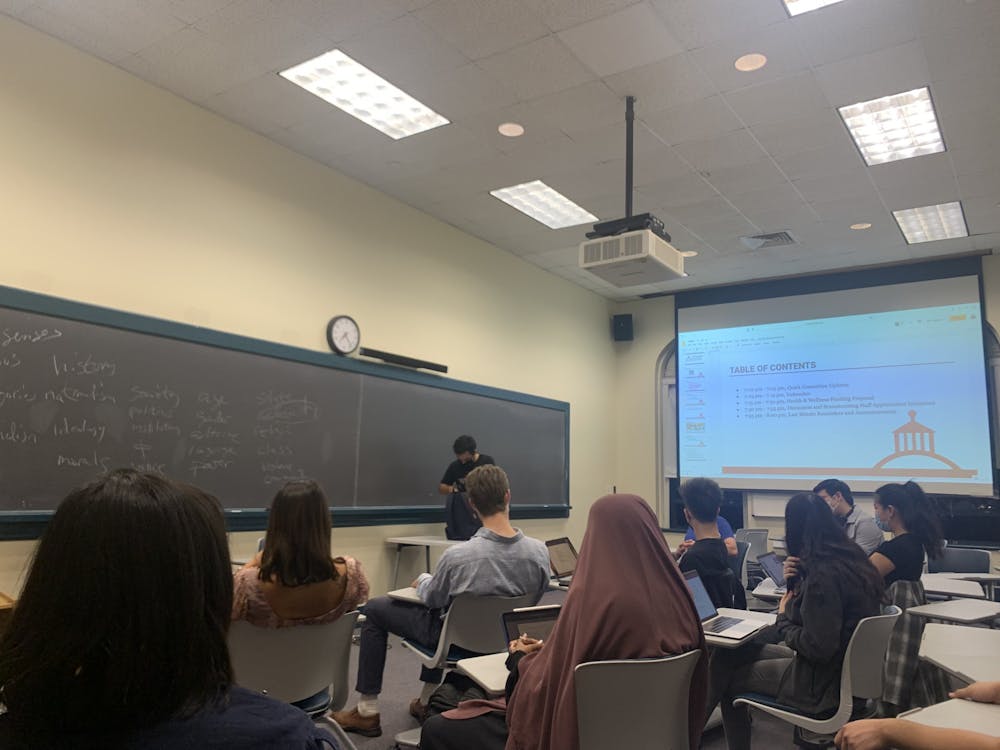The Undergraduate Council of Students shared updates from Vice President of Dining Programs George Barboza about understaffing in University dining halls and discussed how the student body can support Dining Services workers at its general body meeting Wednesday evening.
UCS President Summer Dai ’22 and Vice President Sam Caplan ’22 met this past week with Barboza to discuss the poor working conditions in University dining halls reported by The Herald and shared a summary of their meeting with the Council.
“From his perspective, a lot of the issues that were outlined in the Herald article stemmed from understaffing, so there are a couple of different initiatives right now that dining is pursuing to help the situation,” Caplan said.
One initiative the University is pursuing is expediting the hiring process. “They’re doing huge communication pushes,” Caplan said. “(Barboza) was saying there have been job markets they have never been in before. They’re really, really trying to recruit as many people as possible.”
The University is also trying to recruit and onboard more student dining hall workers but has not received the usual levels of interest, Caplan said.
In their meeting, Barboza shared that “it was typically very easy for Dining Services to hire students, but they haven’t experienced that kind of enthusiasm this year,” Caplan added. A potential reason for this is that “so much of the student body is new and isn’t even aware that students worked in dining halls before the pandemic.”
In response to the reports of the University attempting to recruit more workers, Council members questioned if there is a way to learn how many new individuals are hired to keep track of the situation.
Barboza will be attending the Council’s Nov. 17 general body meeting, during which students will have the opportunity to hear updates, Dai said.
The meeting will be open to the public, so it would also be an opportunity for “anybody invested in this to get direct answers,” Caplan said.
The Council also brainstormed ways students can show appreciation for dining hall workers and staff members.
“A lot of staff have not taken a break” in months, Dai said. “They’ve been working around the clock, and I think we can take some initiative in thanking them for supporting us.”
One idea Council members raised was hosting fundraising events to gather financial support that could be distributed to staff.
“Financial support or any kind of resources begins to address actual need (but) I think it may also be interesting to reach out directly and ask what they want,” said Chair of Academic Affairs Zoë Fuad ’23.5.
While many members agreed that material support could be beneficial, others were concerned about the perception and logistics of giving that support.
“We want to make sure that any initiative we do doesn’t come (across) as condescending,” said Caplan, who also mentioned concern about whether student groups are allowed to distribute money to others.
Other ways to show appreciation that members brainstormed included actions such as hosting an event for dining hall workers, distributing thank you cards and sending out a social media campaign about dining hall etiquette.
The Council also decided to vote on the resolution introduced at last week’s meeting to end the preferential treatment of legacy students in admissions.
Some members hoped to postpone the vote until after the Council’s Nov. 10 general body meeting — which Dean of Admission Logan Powell is set to attend — while others hoped to vote on the resolution before the Corporation meeting.
Wednesday’s discussion follows last week’s debate about whether resolutions are an effective way to push for change from administrators.
The Council ultimately decided to vote on the resolution. Results of the vote will be announced at next week’s general body meeting.





